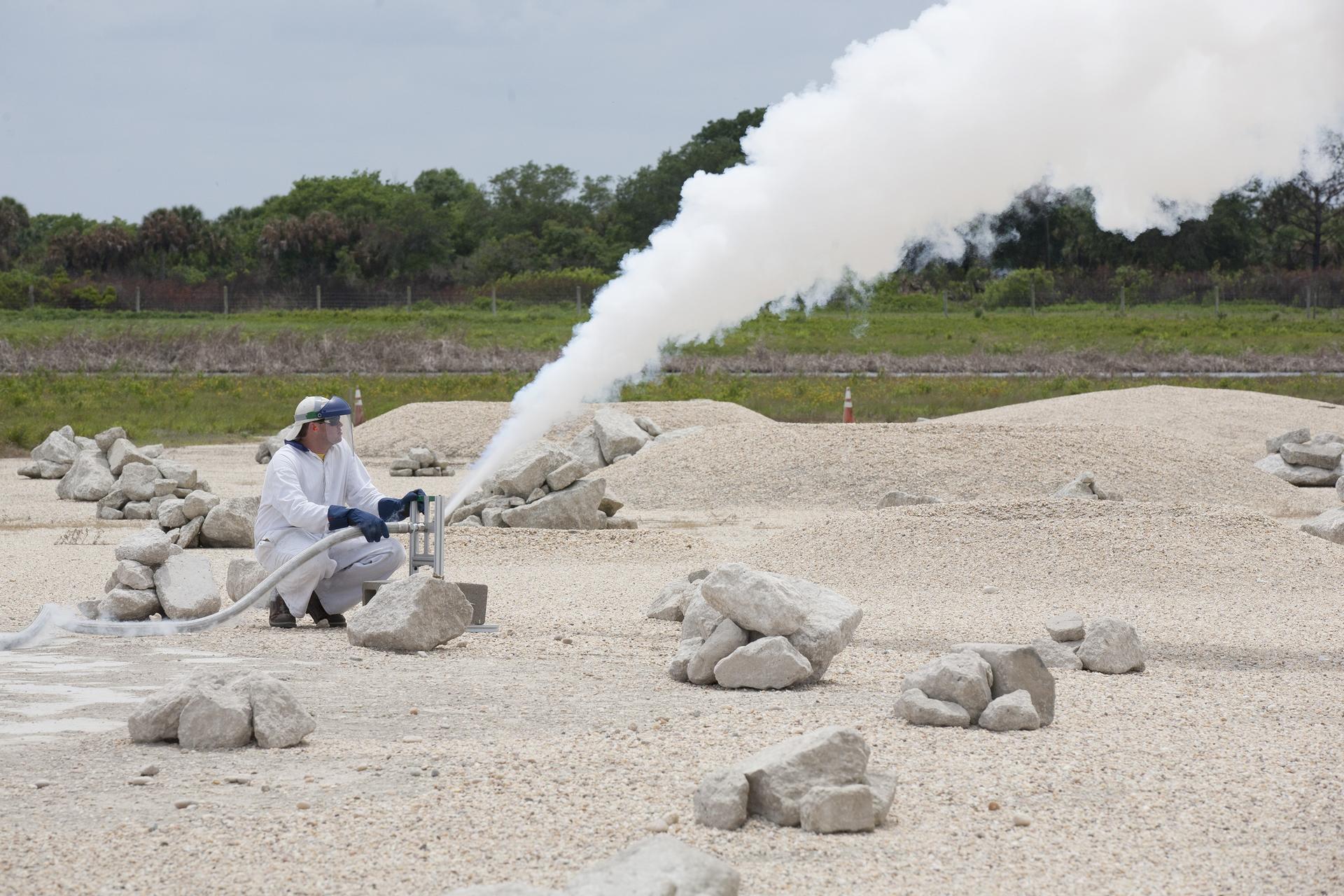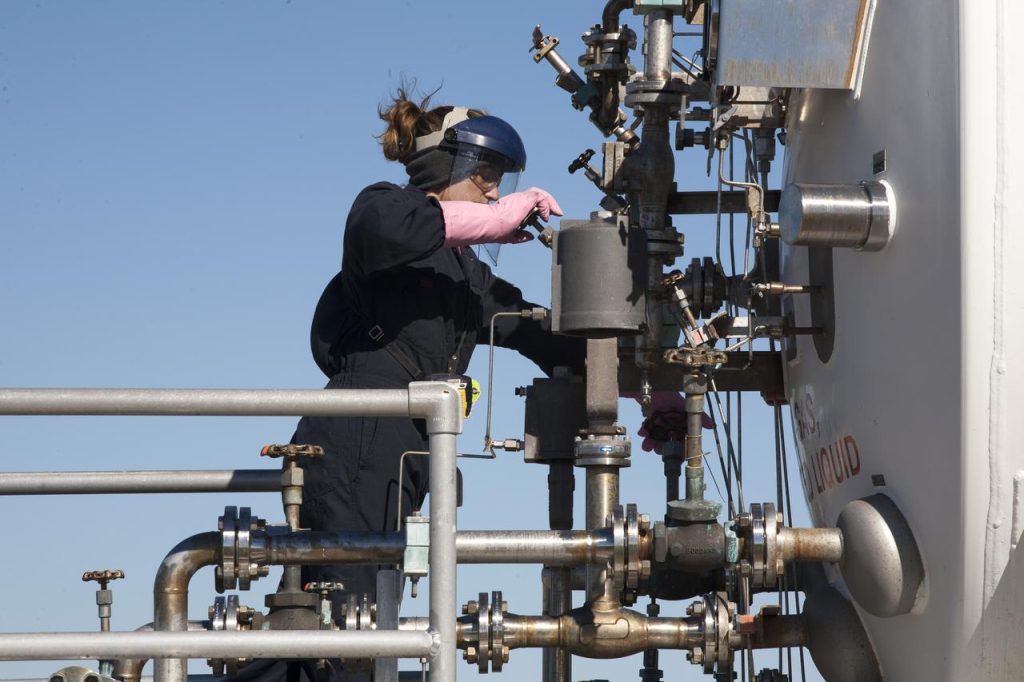
Propellant Handling & Servicing
The NASA Propellants and Life Support Branch (PLS) offers Kennedy Space Center and Cape Canaveral Air Force Station customers one-stop access to over 22 liquid propellants, pressurants, chemicals, and special fluids. Each year PLS completes thousands of support operations for Altas, Delta, Falcon, International Space Station, spacecraft, ad on-board payloads. We bring expertise in PLS logistics, engineering, and business to deliver safe, reliable and cost effective propellant support. Go fly and leave the propellants acquisition, coordination, storage, chemical analysis and distributions to us!
Many aerospace operations require the use of fluids and gases, also known as propellants and pressurants. As the nation’s premier launch site for more than 50 years, KSC offers a high level of engineering expertise and capability related to the acquisition, storage, transfer, sample and analysis, and distribution of propellants, including the associated operations and maintenance of propellant facilities, systems, and equipment. This support includes maintenance of permanent distribution pipelines to major operational facilities such as the launch pads, the Vehicle Assembly Building, the Space Station Processing Facility and the Launch Equipment Test Facility.

A technician monitors the flow of propellant loading in the Project Morpheus prototype lander as it is prepared for its third free flight test at the north end of the Shuttle Landing Facility at NASA’s Kennedy Space Center in Florida.
Capabilities / Services
- Storage, handling, and servicing/de-servicing expertise
- Hypergolic, cryogenic, Freon, ammonia, helium and nitrogen
- Propellant filtering and purification services
- Composite Overwrapped Pressure Vessel (COPV) and pneumatic system servicing expertise
- On-site chemical analysis lab for chemical purity and particulate count
- Material compatibility testing for hypergols and cryogenics
- Advanced leak detection capabilities
- Personal protective equipment development
Accomplishments
- Providing propellants and SCAPE suits in support of flight operations for launch vehicles at the Cape Canaveral Air Force station, including those owned by SpaceX and United Launch Alliance
- Provided propellants and SCAPE support to Lockheed Martin in support of the Orion Exploration Flight Test-1 mission in December of 2014
- Manufactured SCAPE suits for Vandenberg Air Force Base
- Designed and built a molecular sieve for N2O4 purification associated with an on-going JWST iron-leaching test project
- Provided hydrazine for NASA spacecraft missions such as MAVEN, MSL, MMS, and DSCOVER
- Provided propellants and safely loaded fuel for multiple Morpheus Project test flights at the KSC Shuttle Landing Facility
- Providing Breathing Air Purge System to Moon Express for test operations
- Provided support for the Space Shuttle Program:
- Safely performed more than 235 Space Shuttle cryogenic servicing and 90+ successful cryogenic de-servicing operations
- Safely loaded ammonia onto 100+ Space Shuttles, 7 ISS truss elements, and 5 ammonia tank assemblies

Our office is the Responsible Center For NASA-Wide Aerospace Fluids Acquisition and Management. We provide NASA the most cost effective and reliable sources of liquid propellants, gases, and special aerospace fluids. Specific expertises are:
- Leadership in acquisition of aerospace fluids under the Consolidated Contracting Initiative for bulk helium, hydrogen, nitrogen and oxygen, and execution of other technical and administrative contract support
- Core technical expertise in cryogens, gases, hypergols, hydrocarbons, and special aerospace fluids
- Knowledge of market conditions affecting availability and costs of required fluids
- Monitor new program fluid requirements, assess the impacts to current supply sources, and develop strategies for support
- Monitor consumption and costs of major fluids used Agency-wide, and develop strategies for improved fluids logistics
- Represent the Agency on professional, technical, and legislative issues related to fluids logistics
Locally at KSC, PLS duties include:
- Responsible for propellant and life support services and equipment provided under KSC contract to operate and maintain the NASA’s largest and most diverse inventory of propellants and life support equipment
- Responsible for the storage and distribution of 22 different fluids at KSC, Cape Canaveral Air Force Station, and to other local customers
- Provide technical expertise to the design and operation of propellant systems to support space flight hardware processing
- Unique fluid storage and supply capability for high purity anhydrous ammonia, and high purity liquid oxygen
- Oversee design, manufacture and then operate unique support equipment such as: hypergol containers, liquid helium conversion system, liquid oxygen tankers, SCAPE, liquid air packs, and N2O4 Molecular Sieve
- Liquid Air mixing and use
- Provide operation and fluids engineering support to Space Launch System (SLS) and Orion, Atlas V, Delta IV, Falcon 9 space launch systems, the International Space Station, and all KSC/CCAFS spacecraft missions.
Pressure Vessels & Pressurized Systems
The NASA PVS Certification Program is led by the Pressure Systems Manager (PSM) who serves as the Institutional Safety Discipline Lead for Pressure Vessels and Pressurized Systems (PVS) safety. The PVS Program and Staff are part of KSC Safety and Mission Assurance Directorate (S&MA), specifically in the SAE3 Branch.
The PSM is responsible for ensuring that NASA owned PVS are designed, maintained, and operated safely.
- Appointed by Center Director.
- Per NPR 8715.1, ensures Center compliance with applicable PVS regulations and with NASA-STD-8719.17.
- Oversees PVS Center activities to ensure the safe operation of pressure systems, ensure unsafe conditions are corrected, or remove from service any unsafe systems or vessels.
- Holds authority to decertify and lockout a system, to interpret requirements, and provide relief to requirements on a case-by-case basis.
- Certifies that all new or modified pressure systems meet current Code and local requirements.
- Reviews and approves design and procurement specifications.
The PVS Certification Program is mandated by requirements in NASA-STD-8719.17, NASA Requirements for Ground-Based Pressure Vessels and Pressurized Systems.
- Utilizes engineering analysis, inspection and examination, testing, configuration management, and surveillance to ensure the mechanical integrity of existing and new pressure systems.
- Implemented by the Center PSM.
- Assigns responsibility for compliance/deficiency corrections to system owners and operating/maintenance organizations, which perform:
- Engineering, inspection, testing, configuration management, and preparing of certification reports
- Training and certification of their system operators
- Includes responsibility for everyone to say something if they see/hear something!
The PSM holds quarterly and as-needed PVS Safety meetings with the system owners, operating/maintenance organizations, and NASA systems engineers to discuss current certification and inspection status, important code or policy changes, any incidents, or other PVS issues.
The PVS program covers both internal and external (vacuum) pressure vessels and pressure systems. There are very few exemptions to certification, and those exemptions must be cleared through the PSM and documented.
Examples of covered PVS include:
- Cryogenic Dewars
- Liquid and gaseous pipelines and piping systems
- Air receivers
- Vacuum vessels
- Pressure vessels
KSC has approximately 500 active certified systems with approximately 1,200 pressure vessels.
Mobile Equipment operated and maintained on KSC must be 49 CFR compliant.
PVS questions or concerns should be directed to the Pressure Systems Manager.